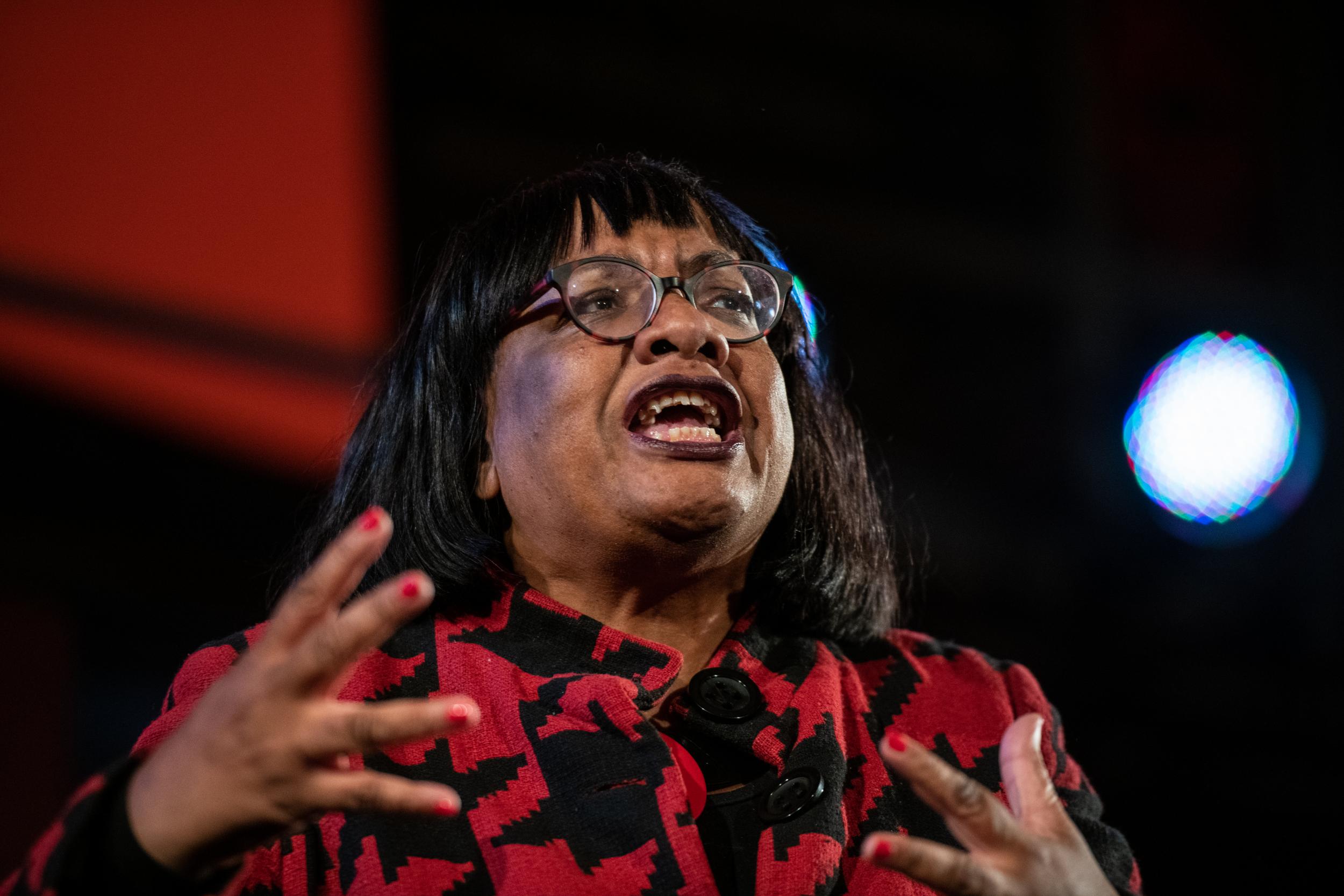Diane Abbott on race relations in UK: ‘Boris Johnson gives the impression that he doesn’t care’
Interview: Labour MP speaks to Maya Oppenheim about systemic racism in the UK, Black Lives Matter, and the abuse she has suffered both online and in Westminster


For Diane Abbott, her experience of racism in Westminster began as soon as she was elected in the late 1980s. “They used to confuse me with Dawn Butler when it was just me and Dawn,” Abbott tells The Independent.
“We would get called by each other’s names. The tacit message is you are just another black person and we are not going to bother to distinguish between you.”
While the former shadow home secretary is no stranger to abuse, she says a combination of a government “willing to play the race card” and a tidal wave of bullying from anonymous online trolls are making the situation worse.
She’s been targeted throughout her 33 years as a Labour MP, from the moment she first set foot in the corridors of Westminster in 1987 as the first black female politician elected to the House of Commons. Among that year’s cohort of new MPs were Bernie Grant and Paul Boateng, the first black male MPs, and Keith Vaz, the first Asian MP since 1929.
“They were endlessly confusing Bernie with Paul and with Keith,” she says.
“You couldn’t get three men that looked more different. But they were endlessly confused. If anybody looks very similar, it’s these white male MPs. They often have the same name. John somebody or other. But they never get confused. They confuse black women. Thirty years ago they were confusing black men that could not look more different.”
These issues continue to plague Westminster. Butler, Labour MP for Brent, previously recounted an incident in a members-only lift when an MP, whom she chose not to identify, told her “this lift really isn’t for cleaners”.
In January, two recently elected black female MPs spoke out about being confused for other politicians and parliamentary staff members. Abena Oppong-Asare, Labour MP for Erith and Thamesmead, accused a Conservative MP of handing her his bag and asking her to look after it after failing to realise she was a fellow MP.
Abbott, who has represented Hackney North and Stoke Newington for half her life, has been subjected to racism not just in Westminster but also on social media and via letters and emails. The 66-year-old was the target of almost half of all the abusive tweets sent to female MPs in the run-up to the 2017 general election, and received 10 times as much abuse as any other female MP, a study by Amnesty International previously revealed.
“That level of abuse has continued,” she says, speaking to The Independent by phone from her home in Hackney. “I don’t religiously go through Twitter but I do go on it. If I looked at every single piece of abuse, it would be very bad for my mental health. I do see some of the abuse and it is horrific.
“I regularly get death threats. We report them to the police. It is difficult to identify the people and prosecute them because they are often tweeting under a pseudonym via non-UK accounts. That is why we need to put an end to anonymity online. The platforms they post on should hold their name and address.”
She said racist vitriol directed at both her and other female black MPs had worsened in the wake of the Black Lives Matter protests despite coming “from a very high base” already.
“There is a spectrum,” she adds. “On one end of the spectrum, there are the people who send me emails, tweets or go on Facebook with death threats or general racist abuse. On the other end of the spectrum is a Tory party which is actually willing to play the race card.
“We saw it in 2017 – they spent a lot of money on Facebook ads which featured me and Jeremy. They got multiple pictures of me and made it sound like I supported Isis and that sort of thing. So on one end of the spectrum, we do have absolutely gross racist abuse, but we certainly saw in 2017 the Tory party and Tory commentators play into the same stereotypes around black people, but in a more subtle way.”
Tens of thousands of protesters have gathered across the UK in recent weeks to challenge police brutality and systemic racism in the wake of the death of George Floyd in US police custody.
Black Lives Matter has taken off here too, she says, not just because of similar concerns about institutional brutality. “It has got a lot to do with not just police abusive powers and deaths in custody, but also the disproportionate death toll from Covid-19. And also Boris Johnson giving the impression that actually he doesn’t care. He set up an inquiry which didn’t offer anything worthwhile in terms of solutions. People think he doesn’t care. Well, he doesn’t care.”
The government has faced sustained criticism over its response to radically disproportionate numbers of people from black and minority ethnic (Bame) backgrounds dying from coronavirus. Critics have expressed outrage over long delays in releasing a report into the coronavirus death rate and condemned the government for its initial failure to outline any recommendations to address these issues.
And the prime minister’s recently announced plan for a new inquiry into racial inequality was dismissed by Labour MP David Lammy as having been “written on the back of a fag packet”.
Abbott said she fears the prevalence and extreme nature of the abuse directed at female MPs will put women off going into politics – adding that this was particularly true for black women. A 2018 report by Amnesty International found black women were 84 per cent more likely than white women to be mentioned in abusive tweets, while some female MPs explicitly cited online harassment as their reason for stepping down ahead of last year’s general election.
The murder of fellow Labour MP Jo Cox, who was brutally shot and stabbed by a far-right extremist in her constituency of Batley and Spen in 2016, has made her far more fearful for her own safety, Abbott said.
“I’ve had abuse for my entire political career and that is over 30 years,” she adds. “At the beginning, it was people writing letters. There was a huge increase when the world went online. When people sent abusive letters or emails, I would say it will never happen and then they killed Jo Cox and you think maybe it can. The death of Jo Cox made me more cautious. And the abuse can be depressing because it is meant to undermine you.”
Abbott has previously spoken out about being relentlessly referred to as a “n*****” and subjected to rape threats online – as well as being bombarded with hundreds of racist letters every day, some of which are emblazoned with swastikas and pictures of chimpanzees and monkeys.
She says the racist vitriol directed against her has once again reared its ugly head in the climate of a Conservative government in denial about systemic racial prejudice within the police, immigration services and the criminal justice system.
“Broadly, the Tory party is in denial about institutional racism in the police force. It has kind of gone backwards. To be fair to Theresa May, she was persuaded about what was problematic about stop and search and tried to bring in some more due process on it but the Tory party has rejected the Theresa May approach. I am not saying Theresa May is some hair-raising radical but she did get the point about stop and search. Priti [Patel] doesn’t think anything of the kind.”
When it comes to the home secretary’s handling of race relations, Abbott is particularly scathing. Earlier this month she was among 32 Labour MPs from Bame backgrounds to accuse Patel of trying to silence debate by “using her heritage and experiences of racism to gaslight the very real racism faced by black people and communities across the UK”.
“She’s [Patel] not given the black community the impression that she understands or cares about institutional racism in general or in the police and immigration service in particular,” Abbott says.
“When they had the Black Lives Matter protest and toppled a statue in Bristol, she sounded like she was more concerned about damaging a statue than the history of the transatlantic slave trade. On the one hand, you have a damaged statue, on the other hand, you have hundreds of thousands of black people that died and suffered because of the slave trade.”
On Sunday, Patel accused the group of Labour MPs, including Abbott herself, of being “racist” for disagreeing with her remarks about her own experiences of discrimination. The politician told Sky News’ Sophy Ridge on Sunday: “They clearly take the stance and the position that I just don’t conform to their preconceived idea or stereotypical view of what an ethnic minority woman should stand for and represent.”
Join our commenting forum
Join thought-provoking conversations, follow other Independent readers and see their replies
Comments
Bookmark popover
Removed from bookmarks